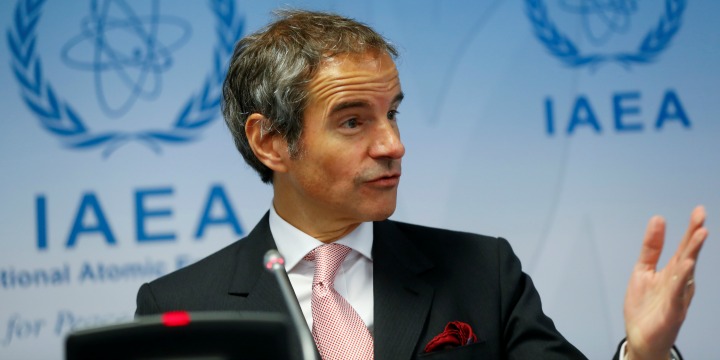Iran’s Threats Against Israel’s Nuclear Facilities Must be Taken Seriously, Israel’s Atomic Energy Head Warns
 by Sharon Wrobel
by Sharon Wrobel

International Atomic Energy Agency (IAEA) Director-General Rafael Grossi addresses the media, after a Board of Governors meeting at the IAEA headquarters, in Vienna, Austria, June 15, 2020. Photo: Reuters / Leonhard Foeger / File.
The threats by Iran and its proxies to target Israel’s nuclear facilities need to be taken seriously, the country’s Atomic Energy Commission chief warned the UN nuclear officials on Wednesday.
“We must not ignore the repeated and explicit threats to attack Israel’s nuclear facilities by Iran and its proxies,” Brig. Gen. (ret.) Moshe Edri, said in a speech at the general conference of the International Atomic Energy Agency (IAEA) in Vienna. “Last year, Israel’s nuclear research centers were once again directly targeted.”
Edri emphasized that nuclear security and protection has most recently come to the forefront of worries in view of the conflict in the Ukraine and threats of a Russian nuclear strike.
Edri told the IAEA that Israel’s facilities are upgraded and reinforced to withstand any attack, and he reiterated Israel’s primary concern that Iran is the “leading factor in the instability” in the Middle East which threatens global security.
Speaking at the conference, IAEA Director General Rafael Mariano Grossi acknowledged that the agency is seeking answers from Tehran to “resolve outstanding issues related to the presence of uranium particles of anthropogenic origin at three undeclared locations in Iran.”
“Since June, Iran has not engaged with the Agency,” Grossi noted. “Consequently, these issues have not been resolved and the Agency is not in a position to provide assurance that Iran’s nuclear programme is exclusively peaceful.”
Grossi’s comments come as indirect talks between Iran and Western powers to try and revive the 2015 nuclear agreement are in a deadlock over several issues, including Tehran’s demand that the IAEA close its probes into uranium traces found at the three undeclared sites. Israel is vehemently opposed to a return to the 2015 deal in its current form, while the Biden administration has been seeking to revive the agreement.
Israel has in recent months stepped up its strikes on Syrian airports to disrupt Iran’s use of aerial delivery of arms and other materials to its proxies in Syria and Lebanon including the Hezbollah terror organization.
“The international community should stand behind the IAEA with a goal towards receiving clear answers from Syria once and for all,” Edri urged.
Edri also raised hopes that Israel’s normalization agreements signed under the so-called Abraham Accords, with Arab states including the United Arab Emirates, Bahrain and Morocco, would also open a path for “meaningful direct dialogue” on the nuclear front.
“Israel’s state of the art technology, provides us with significant levels of knowledge and capabilities, which we are ready to share with others, of course under the IAEA umbrella,” Edri said.
 Iran Sentences Rapper Toomaj Salehi to Death Over 2022-23 Unrest
Iran Sentences Rapper Toomaj Salehi to Death Over 2022-23 Unrest Netanyahu: ‘Antisemitic Mobs Have Taken Over Leading U.S. Universities’
Netanyahu: ‘Antisemitic Mobs Have Taken Over Leading U.S. Universities’ U.S. Decides Against Sanctions on IDF’s Netzah Yehuda Battalion
U.S. Decides Against Sanctions on IDF’s Netzah Yehuda Battalion Israel Says It Is Poised to Move on Rafah
Israel Says It Is Poised to Move on Rafah Israeli Hostage Hersh Goldberg-Polin Seen Alive in a New Hamas Video
Israeli Hostage Hersh Goldberg-Polin Seen Alive in a New Hamas Video Palestinian Prime Minister Announces New Reform Package
Palestinian Prime Minister Announces New Reform Package France: Man Suspected of Abducting, Raping Jewish Woman ‘to Avenge Palestine’
France: Man Suspected of Abducting, Raping Jewish Woman ‘to Avenge Palestine’ Israel Intensifies Strikes Across Gaza, Orders New Evacuations in North
Israel Intensifies Strikes Across Gaza, Orders New Evacuations in North Iran Threatens to Annihilate Israel Should It Launch a Major Attack
Iran Threatens to Annihilate Israel Should It Launch a Major Attack ‘Completely Baseless’: Reports of Mass Graves at Gaza Hospitals are False, IDF Says
‘Completely Baseless’: Reports of Mass Graves at Gaza Hospitals are False, IDF Says



 Israeli Hostage Hersh Goldberg-Polin Seen Alive in a New Hamas Video
Israeli Hostage Hersh Goldberg-Polin Seen Alive in a New Hamas Video Israel Says It Is Poised to Move on Rafah
Israel Says It Is Poised to Move on Rafah U.S. Decides Against Sanctions on IDF’s Netzah Yehuda Battalion
U.S. Decides Against Sanctions on IDF’s Netzah Yehuda Battalion Netanyahu: ‘Antisemitic Mobs Have Taken Over Leading U.S. Universities’
Netanyahu: ‘Antisemitic Mobs Have Taken Over Leading U.S. Universities’ Iran Sentences Rapper Toomaj Salehi to Death Over 2022-23 Unrest
Iran Sentences Rapper Toomaj Salehi to Death Over 2022-23 Unrest